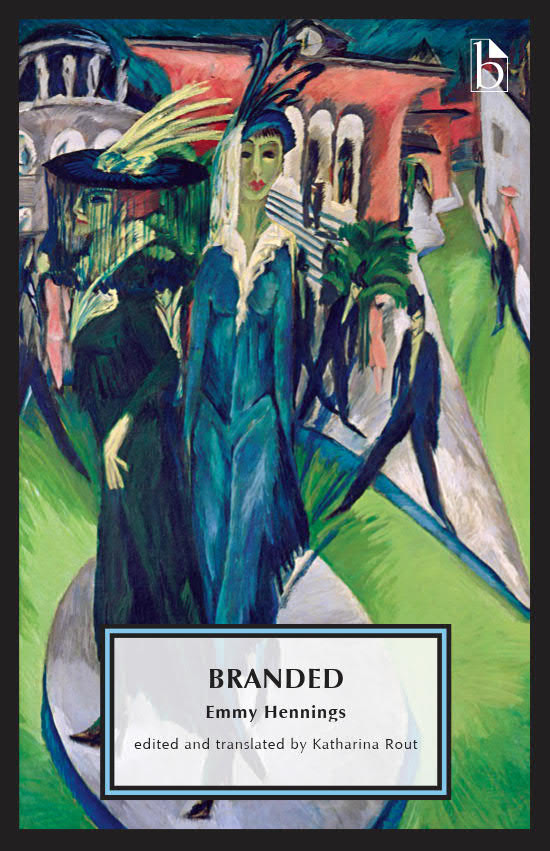Their Bodies Were the Battlefield: War, Women’s Work, and Translating Branded
Katharina Rout
When I first read Emmy Hennings’s Branded, I was struck by its intimacy: a woman who talks with breathtaking honesty about her poverty, despair, and sexual exploitation. It was startling to hear her tell her story with so much wit, humor, and irony, but also to watch her struggle with religious beliefs so incongruous in the world of variety shows, nightclubs, and brothels.
Branded takes us back to the final years of the German Empire and the First World War. In exile in Zurich in neutral Switzerland, Hennings and her cosmopolitan fellow artists from the radical Dada movement used their art to respond to the catastrophe history had brought about. “History […] is the nightmare from which I am trying to awake,” James Joyce, another exile in Zurich, famously had Stephen Dedalus say in Ulysses, which was written contemporaneously with Branded. Hennings strives to record her times as if with a camera or a gramophone recording, two media that had recently become widely available. However, her recording is not of men who were fighting with armies, but of women whose bodies were the battlefields.
Translating a piece of literary fiction is an intimate process. As a translator I needed to find a way into the narrator’s mind and heart to find the voice for that narrator in English. It involved reading other works by the author and her contemporaries, books she had read, scholarly research. Understanding gained this way forms the basis for the conversation or dialogue that my translation enacts.
Just as friendships deepen when friends gradually reveal themselves to each other, just as love grows with understanding and understanding in turn nurtures love, literary translation begins with understanding and, ideally, leads to love. As I spent more time with Hennings and her alter-ego narrator, Dagny, I grew ever fonder of both. And I began to love Dagny, whose passion is all-encompassing: of her suffering as well as of her ardent love and infinite compassion.
Here is a short scene from early in the novel. Desperate for money, Dagny has agreed to hawk decorative “disinfection tablets” that advertise flowering meadows but whose ozone off-gassing she gradually realizes is toxic. Already traumatized by having found herself forced into sex work for survival, she knows how limited her options are—and yet:
For eight weeks, my tongue has almost been deceiving itself, and it can’t continue any longer. My conscience is overwhelming me. To promote yet another hazard on life’s path—it’s too much for me. I can’t stand it anymore. Oh, when I think about that poor woman who stood in the clouds of steam in her kitchen and unsuspectingly bought a tablet from me. I went back to her and said, “It was not right for me to sell you that tablet.”
I could see she lived in great poverty.
She misunderstood me and asked, “Are you feeling sick, Fräulein? You’re as white as a sheet. Please, have a sip of water.”
I made her understand that this was not the problem and put the sixty pfennigs on the table.
“Maybe you can give me back that tablet,” I said. But the tablet already hung on the wall right next to a smoked sausage. And it didn’t matter, I said, whether I got the tablet back. I was so weary.
“What’s the money for?” the woman asked. “I did buy that tablet.”
“That’s exactly it,” I said. “You shouldn’t have bought it.”
“What are you going on about?”
At that I grew despondent and asked for what I had rejected earlier: “Please let me have that water.”
I downed it in one gulp, left the money on the kitchen table, and quickly left.
That was the last meadow I sold in my life. I am done with it.
Dagny is no fool and knows the value of money better than most. Her description of women reduced to selling themselves and the “sensitive gentlemen” who buy their so-called services is clear-sighted:
Mirjam wears a tiny transparent silver purse on her neck. In that little purse glitters a ten-mark coin, Mirjam’s price. She wears it, she says, to educate sensitive gentlemen who can’t talk straight about suggestive matters.
People who want something often carry a kind of symbol with them. Pious people a cross, prisoners their number, dogs the name of their owner, generals their medals.
Symbol and price. Mirjam says she’s wearing a talisman on her neck. I suggested she take bolder action and dangle a twenty-mark coin at a minimum.
But she figured one shouldn’t scare away one’s good luck with overly high demands.
Mirjam’s example has caught on. A goldsmith has been commissioned to make three copies of Mirjam’s purse. The goldsmith has probably no idea he is fashioning containers for the price tags of human beings.
Dagny responds to the pain she both experiences and observes with absolute solidarity and a radical love that extends to the poorest and most despised, to beggars and sex workers, her “sisters” whose sorrows she knows so intimately:
Every fall affects the world, which only appears not to fall with them. […] Whatever affects someone somewhere in the world affects me!
Translating Dagny’s words put me very close to her amazing author, a woman whose courage and radicalism made her forge a path and find her voice in an extraordinarily troubled time. I felt honored to recreate her voice now in English.
As the great translator Edith Grossmann put it in Why Translation Matters, “Translation always helps us to know, to see from a different angle, to attribute new value to what once may have been unfamiliar. As nations and as individuals, we have a critical need for that kind of understanding and insight. The alternative is unthinkable.”
Now more than ever.

